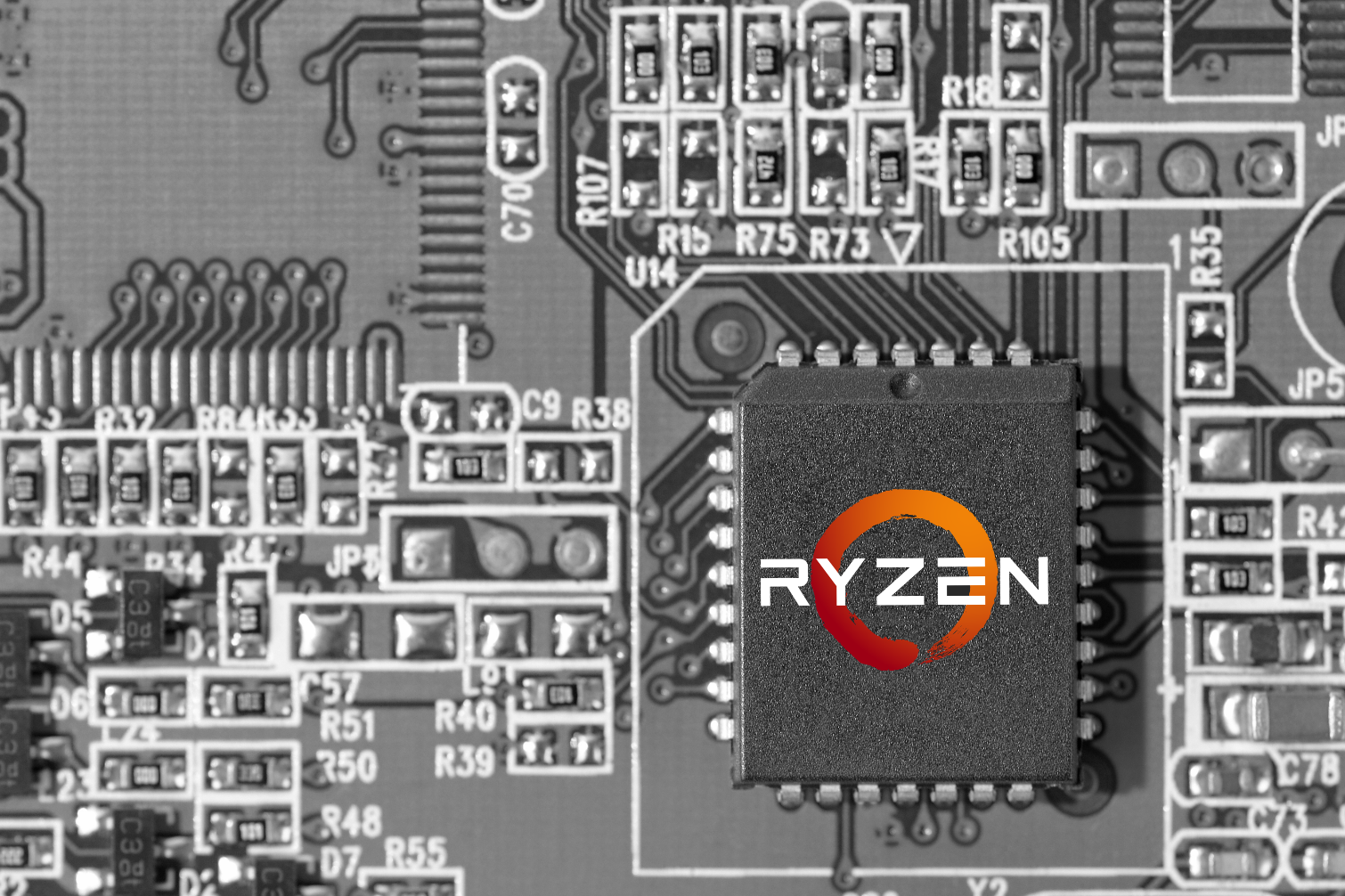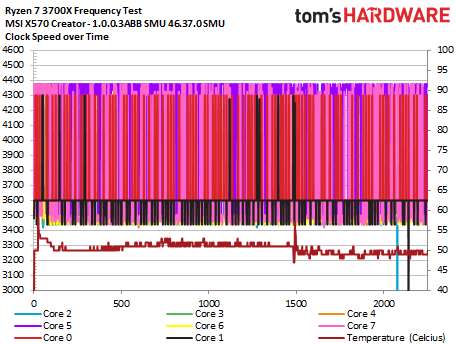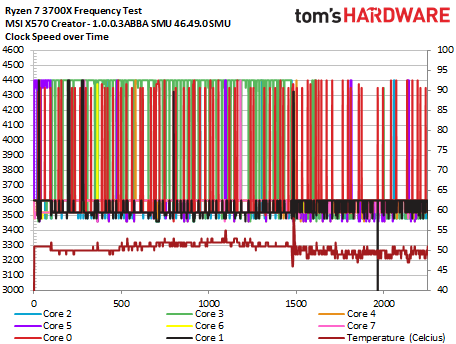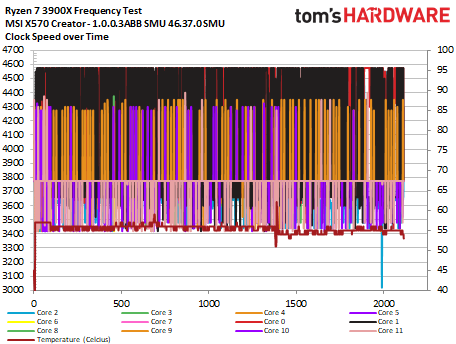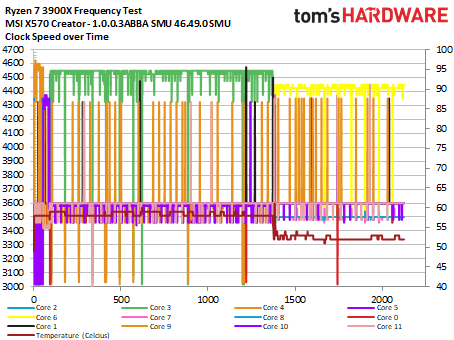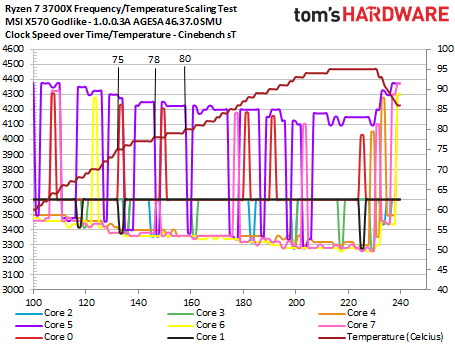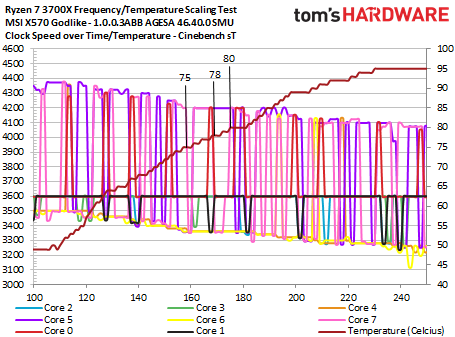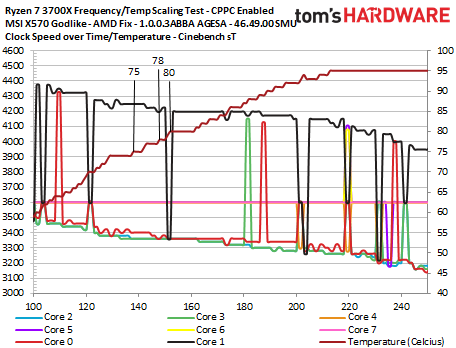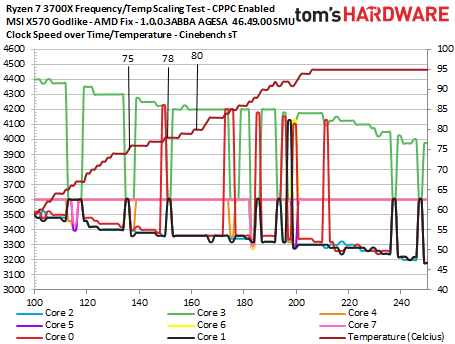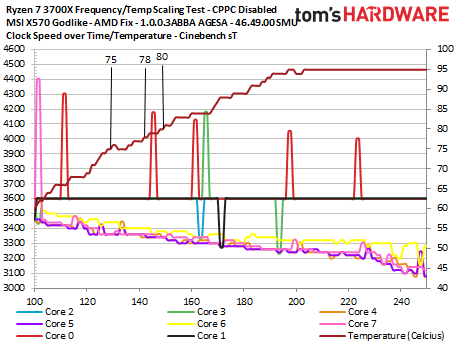AMD's Ryzen 3000 Boost-Fixing BIOS Leaks Out, We Test With Ryzen 9 3900X and Ryzen 7 3700X
AMD's unreleased firmware, which the company says will fix the boost behavior of its Ryzen 3000 processors, has leaked onto the Chiphell forums. We grabbed the download and did a round of testing to see if the new BIOS and SMU fix the boosting behavior of the Ryzen 9 3900X and Ryzen 7 3700X processors.
We have to caution, however, that this is a leaked beta BIOS revision that may not be in its final state, so we'll have to take the results with a grain of salt. In either case, we do see some improvements that fall in line with our expectations for the Ryzen 7 3700X, but we also spotted an odd performance regression with the Ryzen 9 3900X, indicating this firmware is a work in progress.
AMD's Ryzen 3000 series processors landed two months ago, bringing a new level of performance and value for the mainstream desktop as the company took the lead in the race to the leading-edge 7nm node, the first time in its history that it had managed to beat Intel to a denser manufacturing process. But the company's triumphant moment has been marred by persistent reports that the chips aren't achieving their rated boosts speeds, an issue thrust into the spotlight by a recent survey conducted by YouTuber Der8auer in which a surprising number of respondents reported they weren't reaching their rated boost clocks.
That was followed by Intel citing a report that claims reliability is behind AMD's apparent, but not proven, reasons for reducing its chips' frequencies.
AMD announced this week that it had identified an issue with its firmware that reduces performance in some situations and that it would update the community on an incoming fix on September 10.
We dug deep into the issue with tests that suggest AMD had altered the boost behavior of its processors after launch, leading to less aggressive boost behavior if the chip surpasses the 75C threshold.
First we'll look at the "what," to see if the boost frequencies are in fact fixed with this new leaked firmware, and then we'll took a look at the "how" to see the changed behavior that brings the issue under control.
Get Tom's Hardware's best news and in-depth reviews, straight to your inbox.
Hitting The Boost Switches
For the first round of tests, we followed the general testing methodology we outlined in our first investigation of Ryzen 3000's boost behavior. That round of testing found that AMD's Ryzen 3000 processors come with a mix of both faster and slower cores, with the slower cores unable to reach the rated boost specification. To help mitigate the issue, AMD uses the new Windows 10 scheduler to target workloads at the fastest cores first.
The beta MSI BIOS we're using for our tests comes from the Chiphell forums, and it wasn't released through MSI's official channels, meaning there is a chance this isn't the actual BIOS that MSI will release to fix the issue. More news on the official fix will come tomorrow, September 10, 2019.
We ran a series of single- or lightly-threaded tests in rapid succession. The test begins with five iterations of a LAME workload (~35 seconds apiece) that are inherently single-threaded. This is followed by one run apiece of POV-RAY and Cinbench R20, both in single-core testing mode. AMD processors downshift based on the power requirements of the instructions from the task, so these single-threaded tests give us the best chance of capturing single-core boost activity. We're using MSI's X570 Godlike motherboard and AMD-provided chips for testing.
Ryzen 7 3700X Boost Frequencies
Here we plotted the frequency of all eight cores on the left axis, and the temperature (red line at the bottom of the chart) on the right axis. The Ryzen 7 3700X processor is running at its stock settings and a Corsair H115i cooler is running at full speed.
This is the latest version of publicly-posted motherboard firmware for the MSI X570 Godlike motherboard. Here we can see the Ryzen 7 3700X tops out at 4.375 GHz during the run. While this does fall short of the 3700X's rated 4.4 GHz boost, it is by a relatively slim margin. However, the shortcomings vary based on silicon quality, and many users have reported much larger deltas with the 3700X (up to ~250 MHz).
We applied the new ComboPI1.0.0.3ABBA AGESA firmware, and as you can see, the Ryzen 7 3700X now reaches its rated 4.4 GHz across the board. We'll dive in deeper on how AMD rectified the issue shortly.
Ryzen 9 3900X Boost Frequencies
Our tests with the Ryzen 9 3900X don't show the across-the-board improvement we expected, which may be due it still being a beta version.
Here we can see the Ryzen 9 3900X with the older ComboPi1.0.0.3ABB AGESA code. This is the last publicly-posted firmware for the X570 Godlike motherboard. We can see that the chip tops out at 4.575 GHz during the run, with the workload migrating among the cores during the test. That's only 25 MHz short of the chips' spec, but many users have reported up to 300MHz deltas, and more.
With the new firmware the chip peaks at 4.625 GHz during the opening moments of the test. The chip settles to 4.6 GHz during the LAME tests, then runs at 4.55 GHz during the POV-RAY portion of the test. Oddly, the chip drops to a lower threshold during the Cinebench run at the tail end of the test, only reaching 4.425 GHz during that portion (yellow lines).
While we see a higher peak boost, the chip runs at a lower frequency for the majority of the test. This might be a poor implementation of the firmware for this particular motherboard, or could be due to the beta nature of the BIOS. We'll have to wait until newer firmwares are released for this, and other, motherboards to get the full picture. We've pinged MSI for comment to see if the company can reproduce this result.
| Row 0 - Cell 0 | Ryzen 7 3700X Original Firmware | Ryzen 7 3700X Fix | Ryzen 9 3900X Original Firmware | Ryzen 9 3900X Fix |
| LAME (lower is better) | 14.016s | 13.937s | 13.578s | 13.438s |
| POV-RAY Single-Thread Test (higher is better) | 257.35 PPS | 259.11 PPS | 266.77 PPS | 266.76 PPS |
| Cinebench Single-Thread Test (higher is better) | 505.44 | 509.63 | 525.342 | 513.32 |
Even with the working fix with the Ryzen 7 3700X, the faster firmware provides only a marginal performance improvement with our chip. This is largely because our sample already came close to the rated specifications, and users with chips that fall short by a larger margin will experience more of a performance uplift.
The Ryzen 9 3900X doesn't experience as much uplift, registering only a slight improvement in the LAME encoding score, and essentially tying the older firmware in the POV-RAY tests. More importantly, we see a performance regression during the Cinebench test, indicating that this firmware may not be tuned for the Ryzen 9 3900X yet.
Changed Temperature Thresholds
Because the Ryzen 9 3900X exhibited an odd performance regression, we decided to focus on the Ryzen 7 3700X for this salvo of tests. We'll follow up with more testing for the Ryzen 9 3900X when the official firmwares land.
Our most recent testing focused on whether or not AMD had changed the settings of the SMU, a small unit inside the processor that overrides configuration parameters, to reduce the boost frequencies. Dialing back the temperature thresholds for boost activity reduces overall clock speed during extended workloads, which can be used to reign in clock speeds. One industry source claims these adjustments were made to increase the chips' longevity, but while it appears that AMD adjusted the boost parameters, we can't conclusively say it was to extend chip longevity.
We began the tests with all fans and the pump on a Corsair H115i running at full speed. We then kicked off a single-threaded Cinebench test to expose the maximum boost attainable with our Ryzen 7 3700X sample. We allowed this test to run for 60 seconds so the chip could settle into its 'natural' state during the workload, then unplugged the fans and pump and allowed the chip's temperature to rise to 95C. This is the maximum temperature rating of AMD's 7nm processors, which is a lowered range compared to the previous-gen's 100C. That means AMD doesn't have as much thermal headroom to play with.
This testing technique allows us to record changes to the frequency as temperature increases. We did our best to isolate all parameters, and due to that nature of this testing, the cooling solution and ambient temps aren't a factor. These are the same tests we ran in our recent piece, but we're using a different motherboard for this round of testing.
Here we see the test results with the BIOS provided to reviewers for the first round of Ryzen 3000 testing. Again, we plotted the frequency of all eight cores on the left axis, while the temperature is plotted on the right. The temperature reading is the rising red line, and we've added markers to note where the temperature first reaches 75C, 78C, and 80C, which are the focus areas. This BIOS comes with AGESA version 1.0.0.3A and SMU version 46.37.0.
The chip remains comfortably above 4.2 GHz as it moves between 70C and 80C.
Here we can see the latest version of the firmware posted to MSI's site. This test shows the chip dialing back frequency during the focus area, cutting it to a flat 4.2 GHz from 75C to 80C. That results in less aggressive boosting activity during extended workloads. This changed behavior is likely one of the root causes for the Ryzen 3000 boost issues.
We generated these results with the new beta BIOS and SMU version that fixes the boost frequencies for the Ryzen 3 3700X. With older motherboard firmwares, the chips would drop into different power states at the 75C and 80C thresholds. Now the chip stays above 4.2 GHz from 75C to 78C, indicating that Shamino's mention of a new middle-frequency limit was probably accurate.
That means there is more to this fix than just dialing the firmware back to the same limits as the first round of "reviewer BIOS's," which were faster than the BIOS's made public after launch.
We also spotted that MSI added a new Collaborative Power and Performance Control 2 option to its BIOS. This is a software feature that manipulates Ryzen 3000's power states from within the operating system. This is similar to Intel's Speed Shift technology and reduces power state transition latency from 30ms to 1ms, which ultimately saves power and boosts efficiency. The feature comes enabled in the latest AMD chipset drivers and the Windows 10 May update (and newer).
We enabled the feature for the previous tests, but disabled it for this final test. Here we see that the chip doesn't appear to boost correctly with the feature disabled. The presence of this new setting implies that AMD has also made adjustments to this feature, as well.
Thoughts
Oddly enough, the fact that our Ryzen 7 3700X sample is already of good quality, barely missing the rated speeds even with the older firmwares, works against us. The performance uplift with the new BIOS is minimal, but the changes to the thermal thresholds indicate that the new firmware should correct the boost behavior for 3700X's of lower quality.
Unfortunately, we'll have to wait until tomorrow for the official word from AMD on the matter. While this BIOS revision does deliver some of the expected improvements in boost activity, at least with our Ryzen 7 3700X sample, we'll wait until the official release before we come to any firm conclusions.
We'll dive in deeper with these tests, and add frequency and voltage scaling, as well as a broader spate of real-world application testing, as soon as we receive the new firmwares. This firmware appears to be a work in progress, but shows that the bugs are being ironed out and should be fixable. Stay tuned.

Paul Alcorn is the Editor-in-Chief for Tom's Hardware US. He also writes news and reviews on CPUs, storage, and enterprise hardware.
-
NightHawkRMX Intel bites nails nervously.Reply
Seriously, Im not complaining about better performance with just an update.
All intels updates seem to do is take away performance through patches. -
nitrium I'm super happy with my 3700X (coming off a i5 760) - everything feels snappier. I have been checking the boost behaviour of this CPU, and mine for sure never boosts above 4266 MHz - i.e. 133MHz shy of the advertised boost speed. I'm curious to see if the new BIOS fixes this in a real manner, but the discrepancy can be addressed with just a 3% boost increase, which doesn't seem like a huge stretch.Reply -
redgarl Still using an MSI motherboard? You know, the BIOSes from them are taking longer to release and are usually still a work in progress. The x370 BIOSes for 3000 series are still in BETA after 2 months.Reply
As good MSI was for B450 and x470, they are the worst for the x570 chipset. -
redgarl "That's only 0.025 MHz short of the chips' spec, but many users have reported up to 300MHz deltas, and more. "Reply
Should be 0.025GHz or 25MHz. Is it a Beta posting?
"While we see a higher peak boost, the chip runs at a lower frequency for the majority of the test. This might be a poor implementation of the firmware for this particular motherboard, or could be due to the beta nature of the BIOS. We'll have to wait until newer firmwares are released for this, and other, motherboards to get the full picture. We've pinged MSI for comment to see if the company can reproduce this result. "
Nothing to do with AMD, more about MSI... from a Beta BIOS... I don't know why you didn't wait like Anandtech, to get the whole picture before rushing to the start line to be first and reporting this. Unfortunately, this is the trend here now... be the first and don't ask question... JUST POST IT!
"This firmware appears to be a work in progress, but shows that the bugs are being ironed out and are fixable. "
You would have known that if you read my first comment on the matter on your initial hit piece.
https://i.ibb.co/KwtmD4b/toms.jpg -
Iczeman Is there any info that except fixing boost frequencies will new agesa fix isssue with WHEA errors on PCI-E which still occur and causing totally unreliable work/gaming PC platform?Reply -
RodroX I feel like bad to write this again, but just because some users can't reach the advertised boost frecuencies, doesn't mean that all those chips are bad. Many users simple don't have the expertise or experience to deal with BIOS options, Windows intallation and drivers, and whatever unknown software that could be eating thier cpu power on the background.Reply
Also it seems that the CPU is the only one to blame when not reaching the boost frecuecy, when motherboards, chipsets, RAM, and the CPU COOLER colud be all part of the problem many users are havíng. Just a simple loose screw on a stock or after market cooler could be leading them to believe thier CPU is defective.
Im not syaing that BIOS, SMU and microcode in general does not need to be worked out more, better, and updated. Juts pointing out the "issue" in some cases could just be the user.
Cheers -
DMAN999 My 3700x (Asus ROG Strix B450-F Gaming) Already hits 4.4 and even 4.425 GHz on a single core run of Cinebench, so if the new AGESA allows all cores to reach those speeds I will be Very happy.Reply
WByR6zkView: https://imgur.com/WByR6zk -
TJ Hooker Reply
Do you have PBO (or equivalent) enabled in the BIOS?DMAN999 said:My 3700x (Asus ROG Strix B450-F Gaming) Already hits 4.4 and even 4.425 GHz on a single core run of Cinebench, so if the new Agesa allows all cores to read those speeds I will be Very happy. -
DMAN999 Reply
Yes:TJ Hooker said:Do you have PBO (or equivalent) enabled in the BIOS?
6QlCmxjView: https://imgur.com/6QlCmxj -
bigdragon Looks like the new firmware still needs refinement. I expected a little better than the observed marginal improvements. I think AMD is going to need to take a more active and engaged role in firmware for its platforms. I think Intel learned years ago that firmware is hard and partners will only do the minimum to make things work. More resources need to be thrown at this boost clock problem.Reply
Personally, I'm thinking of migrating to a 3900X or 3700X. It may finally be time to retire the i7-4930k. Not sure if the upgrade cost is worth it though.
